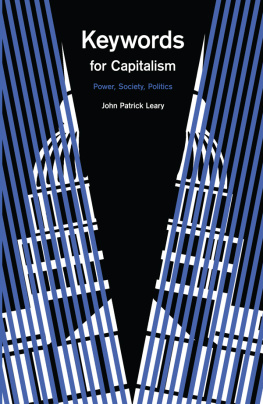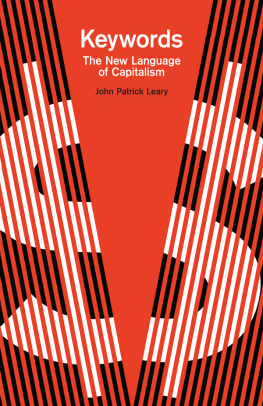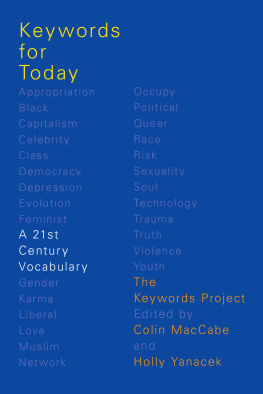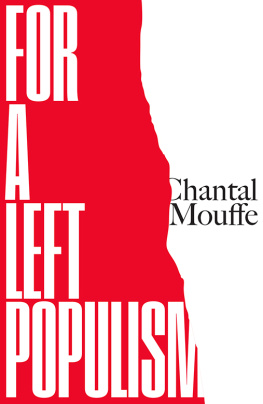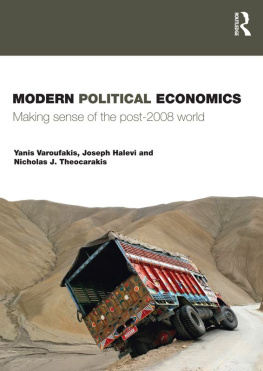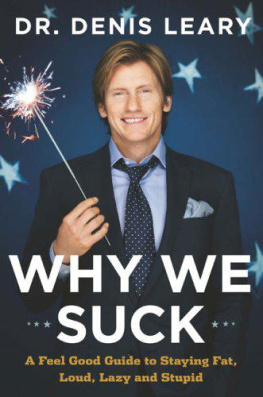Summary
Landmarks
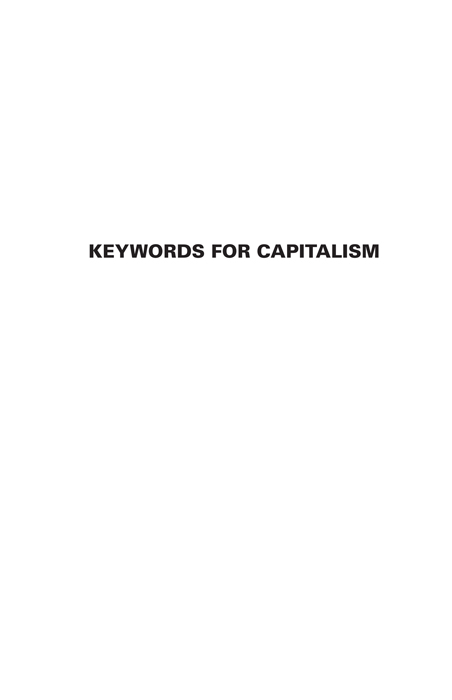
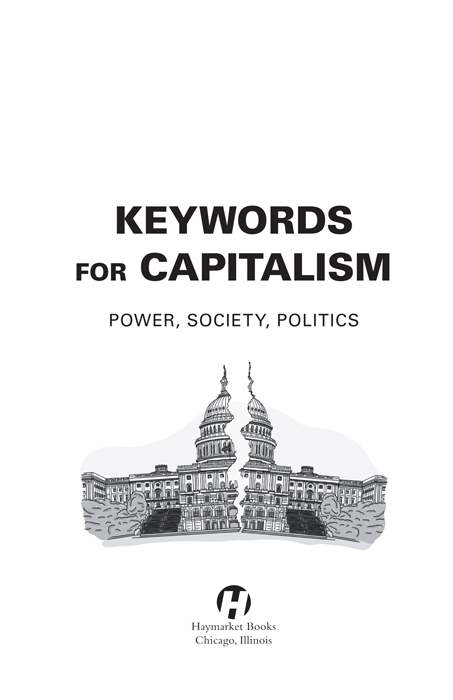
2022 John Patrick Leary
Published in 2022 by
Haymarket Books
P.O. Box 180165
Chicago, IL 60618
773-583-7884
www.haymarketbooks.org
ISBN: 978-1-64259-728-8
Distributed to the trade in the US through Consortium Book Sales and Distribution (www.cbsd.com) and internationally through Ingram Publisher Services International (www.ingramcontent.com).
This book was published with the generous support of Lannan Foundation and Wallace Action Fund.
Special discounts are available for bulk purchases by organizations and institutions. Please call 773-583-7884 or email for more information.
Cover design by Josh MacPhee.
Illustrations by Felecia Wolff.
Library of Congress Cataloging-in-Publication data is available.

INTRODUCTION
SO YOURE INTERESTED IN POLITICS?
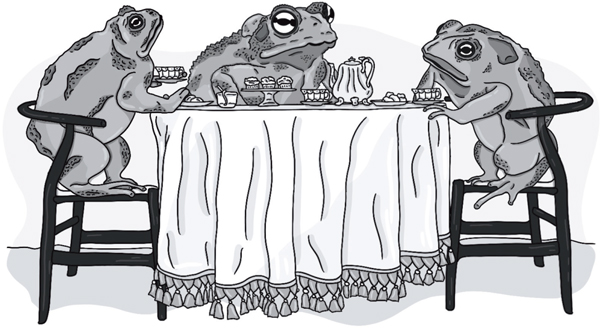
Once in my mid-twenties, while I was visiting my parents near Washington, DC, at Christmas, their new next-door neighbors visited for a bout of compulsory holiday socializing. They were a young professional couple who had just moved into the house once owned by the kind Soviet expatriates who had lived there when I was a childan elderly couple who often invited me in for candy they kept on their coffee table in a crystal bowl. They spoke heavily accented English, drove an odd little European car, and their living room, which smelled pleasantly of pipe smoke, was shaded by thick curtains and crowded with heavy wooden furniture. I never went further than their front sitting room, and I used to peer sometimes at their upstairs window, wondering at their secret lives upstairs. Later, when I was older, my parents mentioned the story the neighbors once told them about pre-Communist wealth and emigrating from Ukraine, but what the details were, I never knew.
These new neighbors, though, had neither the gravity nor the reticence of their predecessors. We were all seated around the coffee table eating cheese and crackers and drinking eggnog when one of them, some sort of downtown lawyer, turned to my older brother, who was about the same age as him, and asked, as if humoring a precocious student: So, are you interested in politics? I remember wanting to murder the guy. Politics here was Washington Post columnists, the PBS NewsHour, red states and blue states, Republicans, Democrats, Bob Dole, Bill Clinton, foreign policy, Thomas Friedmans mustachein a word, Washington, the institution, things my brother knew well enough not to be very interested by. This was politics as a mark of taste and seriousness and a variety of media consumption habits, an absorbing game and a cocktail party conversation starter.
This book explores how we learn to talk about political power and its uses in print, on television, and online. By focusing on the keywords of contemporary politics, especially as it is practiced in English in the United States, this book is meant to help readers trapped, literally or only figuratively, in the sorts of impotent discussions of governance, policy, or personalities that often pass for political discussion in print and television media and in living rooms across the country.
Although it is organized alphabetically, its not intended as a glossary of any particular political tendency, nor a handbook for activists, nor a collection of theoretical concepts. My hope is instead that these entries give readers some tools to decode the insidious vocabulary of political speech and media, in order to understand better what is hidden and communicated in those domains. It may help readers invested in a more forthright practice of politics find a usable vocabulary for doing so. And finally, it should offer a sense of the relief that comes from what I think of as motivated disgustits one thing to know that a piece of political commentary is repellent, but its much more energizing to understand why.
The chapters to follow are divided into three sections, which refer to three different but related definitions of this thing, politics. The first refers to politics as a sport and an industry, the thing apart from normal life known in the United States by the appropriate metaphor of the horse race. We call elections a horse race because they are a spectacle, the purpose of which is the pleasure we get from watching the contest. This pleasure comes from finding out who wins, but it also derives from our enjoyment of the elaborate stagecraft involved in putting on the show, part of which is the esoteric expertise that claims to divine the likely outcomes for anxious bettors and fans. Why a horse race, though, and not some other sport? Part of it is the gambling elementboth elections and horse races have stakes. But the crucial aspect of the horse race metaphor is the nature of the athletes. Most other games, like basketball or soccer, are things you can play, as well as watch. With horse races, all you can do is be a spectator: the creatures participating, after all, belong to a different species than you. So it is, or at least how it seems, with US electoral politics.
The next two sections treat politics as an embedded part of our actual lives, as the exercise of power to move and order human societies. Rather than politics as a profession, a show, or a cultivated interest, the stuff of cocktail parties, televised debates, or dating profiles you might skip past, this is the stuff you cant possibly avoid. Part 2, Structures, treats politics as the structures of power in any societywhich is to say, the institutions, class formations, and collective identities that people mobilize within and against. Part 3, Movements, is about politics as a sphere of mass organization and conflict, aimed at wielding the power to transform society. This is politics as an activity, as something one conscientiously does in solidarity with, and in opposition to, other people and other movements.
The inspiration for this linguistic mode of analysis is Keywords: A Vocabulary of Culture and Society (1976), in which the Welsh literary critic Raymond Williams described keywords as key in a pair of related ways. In one sense, keywords are significant: they are binding words, containing and constraining certain forms of thought, organizing the common sense of a given place and time. Besides importance, then, this key metaphor refers to locking and unlocking the binds that certain meanings place us in. Certain other uses of particular keywords, Williams explained, seemed to me to open up issues and problems of which we all needed to be very much more conscious. Here, Williamss keywords are key because examining them opens something up. Take, for example, his discussion of democracy, a word whose binding action is particularly stifling: its a word that for most of the twentieth century and all of the twenty-first has been nearly universally praised in different political systems, offering liberatory alibis to authoritarian communist states (peoples democracies) or oligarchic or bureaucratic systems in the capitalist world. These days,

